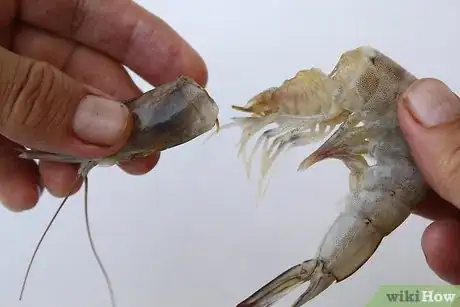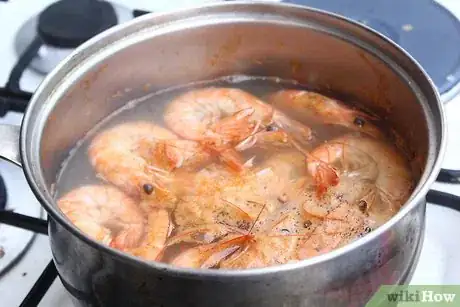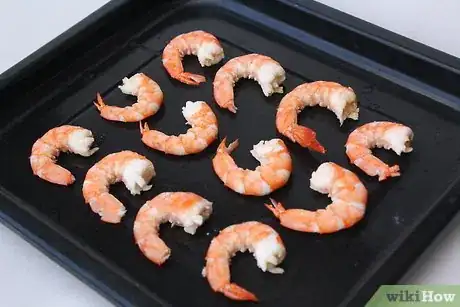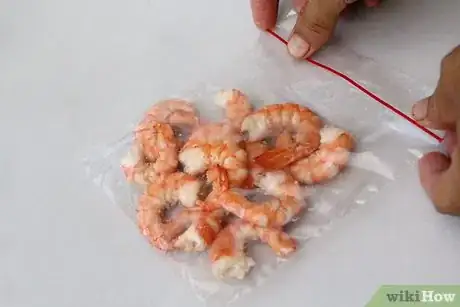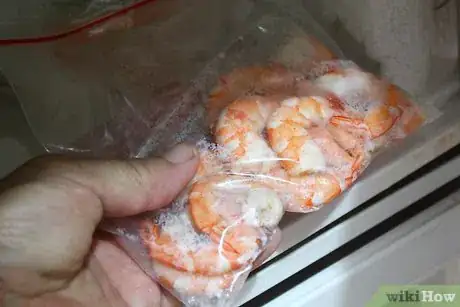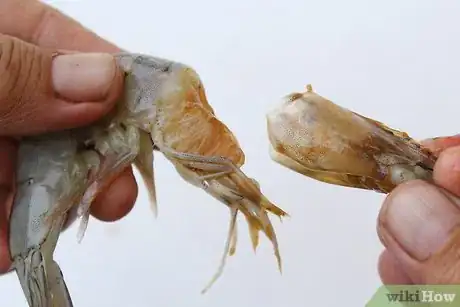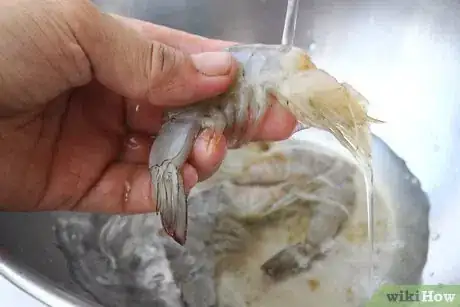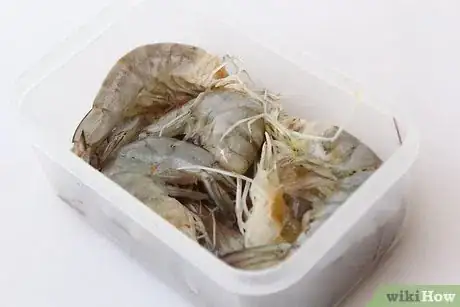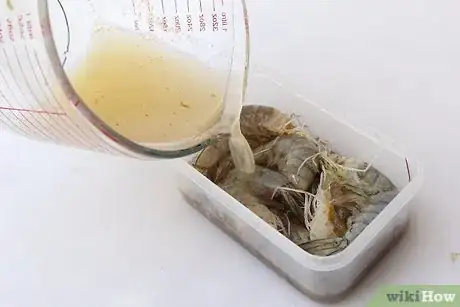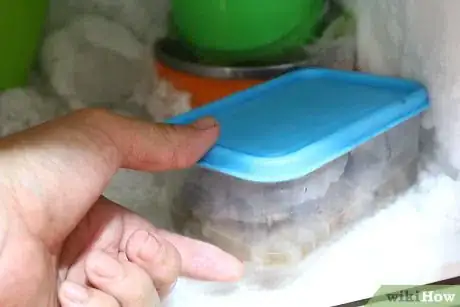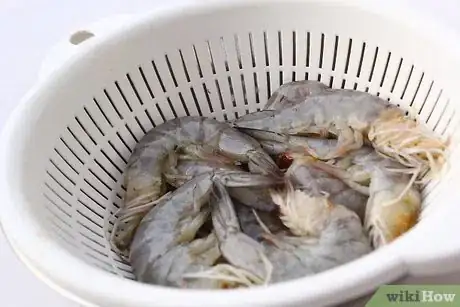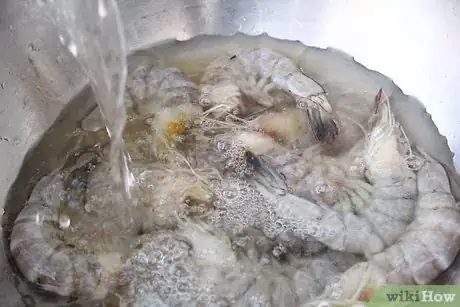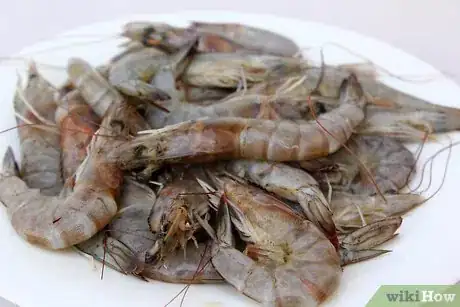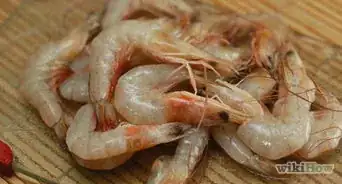This article was co-authored by Jennifer Levasseur. Chef Jennifer Levasseur is a Personal Chef and the Owner of The Happy Cuisiniere based in Breckenridge, Colorado. She has over 12 years of culinary experience and specializes in Mountain and Contemporary Rustic cuisine. Moreover, she can craft dishes and modify menus to accommodate dietary restrictions, such as gluten-free, vegetarian, vegan, pescatarian, and dairy-free diets. In addition to a Bachelor’s degree in Marketing and Management from the University of Houston, Chef Jennifer holds Associate’s degrees in Culinary Arts and Baking & Pastry Arts from Houston Community College.
There are 8 references cited in this article, which can be found at the bottom of the page.
This article has been viewed 86,470 times.
If you have plenty of cooked or raw shrimp, freezing it is the best way to store it. At most, shrimp stays preserved in a refrigerator for 1-2 days without spoiling. However, frozen shrimp can keep for up to 6 months without losing its flavor. Once you've packed and frozen your shrimp, you'll be able to store it for months at a time!
Steps
Freezing Cooked Shrimp
-
1Pick the shrimp meat from the shells. Cooked shrimp keeps best if it's been shelled before freezing. Pull off the shells and tails with your hands and snap off the head, if you didn't remove it while cooking.[1]
- Avoid leaving cooked shrimp out on the counter for more than 2 hours. If you don't have time to shell all the shrimp at once, put them in the fridge between breaks.
- You can also remove the large vein along the shrimp's back if you prefer, but it's not necessary for freezing.
-
2Boil the shrimp for about 10 minutes. Fill a pot with water and bring it to a boil, then pour your shrimp in. Let them simmer for about 10 minutes to remove any bacteria or residual shell pieces.[2]
- This is separate from cooking the shrimp and is done when you're ready to freeze it, as boiling cooked shrimp takes care of harmful bacteria.
Advertisement -
3Place the cooked shrimp on a baking sheet and put it in the freezer. Remove the shrimp from the pot and line them evenly along a baking sheet. Leave them in the freezer until they become firm and hard to the touch. This will prevent the cooked shrimp from clumping together, as cooked shrimp is best preserved separately.[3]
- Freeze the shrimp within 1-2 days after boiling them to keep them from spoiling.
- If you don't have enough space to keep cookie sheets in the fridge long-term, don't worry—you will store them in smaller containers after they've frozen.
-
4Pack the shrimp in large freezer bags. When you've frozen the shrimp, remove the cookie sheet from the freezer and transfer them to sealable bags. As you close the bags shut, squeeze out as much air as possible before putting them in the freezer.[4]
- Label the bags with the date before you put them in the freezer. That way, you know how long you have until they expire.
-
5
Freezing Raw Shrimp
-
1Remove the shrimp heads before freezing them. Pull off the heads of the shrimp with your hands or chop them off with a knife. Unlike freezing cooked shrimp, do not take off the shells or veins. Raw shrimp stays preserved best if it's left in its shell while frozen.[7]
- Do not leave raw shrimp on the counter for more than 2 hours to prevent spoilage.
- Although you can remove the shrimp shells to conserve space, they may not retain as fresh of a flavor.
-
2Wash the shrimp under running water. Place the shrimp in a bowl and place them under your sink's faucet. Turn on the water and rinse them thoroughly, removing any visible debris if you notice any.[8]
- Getting the shrimp wet before freezing them creates an icy glaze that helps them stay preserved longer.
-
3Pack the shrimp in rigid containers. Take the shrimp out from the sink and place them in a tupperware container or similarly rigid container (like a yogurt tub). Leave as little room between the shrimp as possible to limit how much air is in the container.[9]
- Freeze the packed shrimp within 1-2 days, as raw shrimp can only last up to 2 days in the fridge.
-
4Pour a brine solution into the container. Mix a brine solution of 2 tablespoons of salt per 1 US qt (0.95 L) of water. Fill the container with the brine, leaving about an inch or several centimeters at the top for the water to expand, and set it in the fridge to store it. Until the brine freezes, leave the container in a spot where it can stay upright to prevent spilling.[10]
- Label the container with the date to help you remember how much time you have until it expires.
- You can buy brine from some seafood specialty shops as an alternative.
-
5Store frozen raw shrimp for 3-6 months at a time. Both raw and cooked shrimp stays preserved for up to 6 months while frozen. Once you reach 3 months, however, plan to use the shrimp within the next several months for the best taste.[11]
- As long as the shrimp stay frozen, they technically do not expire. Their flavor and ability to withstand freezer burn, however, rapidly deteriorates.[12]
Thawing Frozen Shrimp
-
1Place the frozen shrimp on a colander and leave them to thaw. Transfer the shrimp from their containers to a colander, placing a plate underneath to catch water. Let the shrimp thaw on your kitchen counter or in the fridge, depending on the room's temperature.[13]
- It is safe to thaw shrimp at room temperature for up to 2 hours at a time.[14]
-
2Thaw the shrimp under running water for a faster alternative. If you need to thaw shrimp quickly, turn on your sink's faucet to warm water. Leave the shrimp under the warm water until they become soft to touch and have thawed completely.[15]
-
3Cook or refrigerate thawed shrimp within 1-2 days. You can store shrimp for up to 2 days in the fridge after thawing it without worrying about spoilage. If possible, thaw shrimp immediately before you plan to cook it.[16]
- Avoid refreezing the shrimp afterward, as freezing and thawing shrimp multiple times can ruin their taste.
Community Q&A
-
QuestionHow long can you freeze fresh shrimp?
 wikiHow Staff EditorThis answer was written by one of our trained team of researchers who validated it for accuracy and comprehensiveness.
wikiHow Staff EditorThis answer was written by one of our trained team of researchers who validated it for accuracy and comprehensiveness.
Staff Answer wikiHow Staff EditorStaff AnswerIf you store it properly and maintain a consistent temperature in your freezer, raw shrimp will stay good in your freezer for 3-6 months. It’s likely still safe to eat after that time, but the quality may not be as good.
wikiHow Staff EditorStaff AnswerIf you store it properly and maintain a consistent temperature in your freezer, raw shrimp will stay good in your freezer for 3-6 months. It’s likely still safe to eat after that time, but the quality may not be as good. -
QuestionCan you freeze raw shrimp twice?
 wikiHow Staff EditorThis answer was written by one of our trained team of researchers who validated it for accuracy and comprehensiveness.
wikiHow Staff EditorThis answer was written by one of our trained team of researchers who validated it for accuracy and comprehensiveness.
Staff Answer wikiHow Staff EditorStaff AnswerIt’s not a good idea to refreeze any kind of raw meat. The freezing and thawing process breaks down cells in the meat, causing it to become mushy and making it taste worse. The more often you refreeze and thaw your shrimp, the more the quality will degrade.
wikiHow Staff EditorStaff AnswerIt’s not a good idea to refreeze any kind of raw meat. The freezing and thawing process breaks down cells in the meat, causing it to become mushy and making it taste worse. The more often you refreeze and thaw your shrimp, the more the quality will degrade. -
QuestionCan you freeze pasta with shrimp?
 wikiHow Staff EditorThis answer was written by one of our trained team of researchers who validated it for accuracy and comprehensiveness.
wikiHow Staff EditorThis answer was written by one of our trained team of researchers who validated it for accuracy and comprehensiveness.
Staff Answer wikiHow Staff EditorStaff AnswerYou can, but keep in mind that cream sauces don’t freeze and reheat especially well—so your shrimp alfredo might not taste quite as good after you warm it up again. Pasta also freezes better if you cook it al dente (slightly chewy), since it won’t come out as mushy when you reheat it. Put the pasta in a well-sealed, freezer-safe container to keep it fresh.
wikiHow Staff EditorStaff AnswerYou can, but keep in mind that cream sauces don’t freeze and reheat especially well—so your shrimp alfredo might not taste quite as good after you warm it up again. Pasta also freezes better if you cook it al dente (slightly chewy), since it won’t come out as mushy when you reheat it. Put the pasta in a well-sealed, freezer-safe container to keep it fresh.
Warnings
- Watch out for warning signs of spoiled shrimp after thawing, including a faded color, slimy texture, and strong, fishy smell.[18]⧼thumbs_response⧽
Things You'll Need
Freezing Cooked Shrimp
- Pot
- Water
- Baking sheet
- Freezer bags
Freezing Raw Shrimp
- Water
- Bowl
- Rigid container
- Salt
Thawing Frozen Shrimp
- Colander
- Plate
References
- ↑ https://newengland.com/today/food/cooking-advice/how-to-freeze-shrimp/
- ↑ http://missourifamilies.org/quick/foodsafetyqa/qafs394.htm
- ↑ http://www.saltchef.com/preparing_fish_seafood/freezing_defrosting_seafood.html
- ↑ http://www.seagrantfish.lsu.edu/resources/factsheets/handling_freezing.htm
- ↑ https://nchfp.uga.edu/how/freeze/shrimp.html
- ↑ http://www.stilltasty.com/fooditems/index/18321l
- ↑ http://www.seagrantfish.lsu.edu/resources/factsheets/handling_freezing.htm
- ↑ http://missourifamilies.org/quick/foodsafetyqa/qafs394.htm
- ↑ https://newengland.com/today/food/cooking-advice/how-to-freeze-shrimp/
- ↑ https://newengland.com/today/food/cooking-advice/how-to-freeze-shrimp/
- ↑ https://nchfp.uga.edu/how/freeze/shrimp.html
- ↑ http://www.stilltasty.com/fooditems/index/18321l
- ↑ https://newengland.com/today/food/cooking-advice/how-to-freeze-shrimp/
- ↑ http://www.stilltasty.com/fooditems/index/18321
- ↑ https://newengland.com/today/food/cooking-advice/how-to-freeze-shrimp/
- ↑ https://www.eatbydate.com/proteins/seafood/how-long-does-shrimp-last/
- ↑ https://nchfp.uga.edu/how/freeze/shrimp.html
- ↑ http://www.stilltasty.com/fooditems/index/18321
About This Article
Freezing your shrimp will preserve it for up to 6 months without losing flavor. If your shrimp is fresh, remove the heads and shells and rinse it under running water. Then, prepare a brine solution with 2 tablespoons of salt per quart of water. Place your shrimp in a sealable container, fill it with your brine solution, and store it in the freezer. If you’ve already cooked your shrimp, place it in the freezer on a baking sheet to prevent it from clumping together. Once it's frozen, transfer it to sealable freezer bags and return it to the freezer. For more tips, including how to thaw frozen shrimp, read on!
